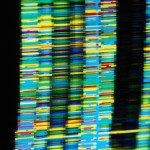Link to Pubmed [PMID] – 17159983
Nat. Immunol. 2007 Jan;8(1):47-56
Phosphorylation of histone H3 at Ser10 increases chromatin accessibility to transcription factor NF-kappaB on a subset of genes involved in immune responses. Here we report that a bacterial pathogen abrogated phosphorylation of histone H3 to ‘shape’ the transcriptional responses of infected host cells. We identify the Shigella flexneri protein effector OspF as a dually specific phosphatase that dephosphorylated mitogen-activated protein kinases in the nucleus, thus preventing histone H3 phosphorylation at Ser10 in a gene-specific way. That activity of OspF enabled shigella to block the activation of a subset of NF-kappaB-responsive genes, leading to compromised recruitment of polymorphonuclear leukocytes to infected tissues. S. flexneri has thus evolved the capacity to precisely modulate host cell epigenetic ‘information’ as a strategy for repressing innate immunity.




